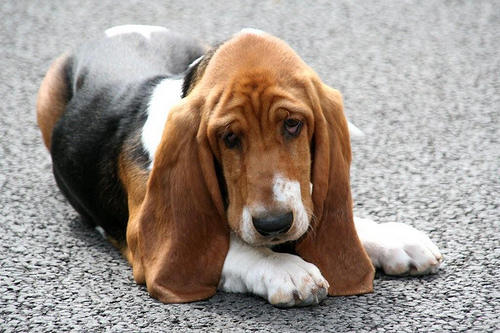 No one could figure out what was the matter with little Charley. There was a notable loss of appetite, he was sleeping for longer periods of time and the pet looked restless.
No one could figure out what was the matter with little Charley. There was a notable loss of appetite, he was sleeping for longer periods of time and the pet looked restless.
Charley’s owners, thinking he must be ill, had a little Basset hound checked by the vet. All the test results came back negative. Another month went by and Charley was getting worse. But a check to yet another veterinarian only confirmed the opinion of the first one. Nothing was physically wrong with the little guy.
In desperation, Charley’s owners gave me a call in my professional capacity as a pet psychologist. They felt a little foolish and admitted that their friends had made jokes, laughing over the image of a doggie on the couch pouring out its heart to a shrink. But nonetheless, the owners wanted to know if Charley could have psychological problems, and there was such a thing as pet depression?
I explained that the controversy over whether pets become depressed is so strong it provokes angered responses from all sides. Believers in pet depression say that of course they become depressed – it’s obvious in their behavior and it makes common sense. But the disbelievers argue the animal fanatics are unfairly attributing human behavior to pets.
The problem actually revolves around new behavior theories on pet’s emotional capabilities and how they interact with families.
I believe anyone who has had a close relationship with a pet knows the answer to pet depression is an unequivocal yes. Animals have a wide range of emotions, and being down is certainly possible. I also believe that anyone taking the opposite point of view has not spent time building a special pet relationship.
I’ve seen many pets mourn their deceased masters or a special play pal. There are many documented stories of Franklin D Roosevelt’s beloved little dog Fala, grieving after the president’s death. Divorces aren’t easy on pets, and it is not uncommon for depression to set in when kids move out of the home.
Can you recognize the type of depression that can kill off your pet a little at a time? Take a look at this scenario: You’ve been fairly busy for days or weeks, there don’t seem to be enough hours in a day. The gets under foot, the cats yowling for food for the fourth time that day, and you’ve got a million things to do. You yell and they pull back their ears and slink off to the corner, placing their heads down.

Tomorrow comes and you’re still busy, and the pet finds himself a part of the furniture. The following day, WOW, you go to the park, run together an even split an ice cream cone. The next week comes and goes and your busy again. Unintentional neglect is the number one cause of depression in our pets. It happens gradually, until all of the sudden the pet looks old.
If you’re a pet owner, be alert to some of the symptoms Charley was displaying. If your veterinarian can’t find the problem, your pet could be suffering from pet depression. Consider your pet a member of the family and treat him that way.
As for little Charley, the pet owners were ignoring him without realizing it. Now, every night Charley meets them with a gleam in his eyes, grabs his ball and they play. Charley is full of bounce and is happy again.
